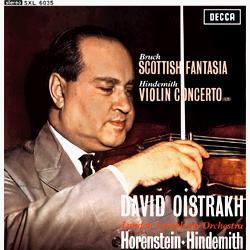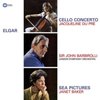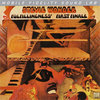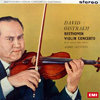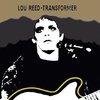AAA 100% Analogue This LP was Remastered using Pure Analogue Components Only from the Master Tapes through to the Cutting Head
Speakers Corner / Decca - SXL 6035 - 180 Gram Virgin Vinyl - AAA 100% Analogue
Mastered by Tony Hawkins - Limited Edition - Pure Analogue Audiophile Mastering
AAA 100% Analogue - Pressed at Pallas Germany
Speakers Corner 25 Years Pure Analogue This LP is an Entirely Analogue Production
It seems rather obvious to us that audio publications -- print and online -- give away too many awards. At the end of each year, high-end audio begins to resemble a little-league team for which every player gets a trophy, sometimes for a dubious "achievement." It is for this reason that we present only two awards that reflect The Audio Beat's areas of emphasis: audio equipment and music. For music, Speakers Corner's Decca LPs were an easy choice. Speakers Corner not only used the true master tapes in the creation of its reissues, but also the actual equipment with which so many of the original pressings were created. Along with this, Decca engineer Tony Hawkins cut the lacquers. The results speak for themselves. We congratulate all of the winners -- of our awards, that is. The Audio Beat
This whole LP is fantastic. Great orchestral playing and the soloist if beyond superb. The sound is super with great sonority and lots of bass slam and hall ambience. Go get it now! Sweet violin tone that sounds very close. Oh the sound of the bow on the strings. What a sound! Rated 19 /20 in Robert Moon, Blue Back Guide.
Sound 5/5 Living Vinyl
Bruch: Scottish Fantasy / Hindemith: Violin Concerto - David Oistrakh, London Symphony Orchestra conducted by Jascha Horenstein and Paul Hindemith
Max Bruch’s Scottish Fantasia is a late-Romantic work which is seldom found on concert hall programmes today. One realises after listening to the piece for the first time that the composition proves to be at least as solid and artistic as all the other works of the composer.
The London Symphony Orchestra, conducted by Jascha Horenstein gives a sonorous interpretation of the melancholic which, according to Bruch, depicted an aged minstrel who, while gazing upon the ruins of an ancient keep, ponders over the splendid days gone by. The well-known slender but warm timbre of David Oistrakh’s violin is well suited to this music which was inspired by Scotland.
David Oistrakh demonstrates his versatility in this performance of Hindemith’s Violin Concerto, written in 1939, where he effortlessly mesmerises the audience with breakneck cascades of scales. With many years of experience in the performance of modern music, the London Symphony Orchestra, led by the composer himself, prove that they are a match for this work.
This Decca recording offers first class interpretations of two great masterpieces from differing eras that have been acclaimed widely and have reached far beyond the circle of Oistrakh fans.
"Hindemith's concerto has never before blossomed into such rewarding lyricism. Even the orchestral contribution under the composer himself is strikingly passionate and with the soloist to provide many moments when the ear is ravished by the beauty of phrasing and inflection, the listener has much to enjoy. The recording is one of the very finest ever made of the combination of solo violin and orchestra. The Oistrakh/Horenstein performance completely displaces its competitors. It is marvelously well recorded -- Oistrakh has never sounded so real on a disc before -- and the reading owes nearly as much to the conductor as the soloist. The expansive dignity of the opening of the brass sets shows immediately how fine the orchestral contribution is going to be and Oistrakh's playing throughout is ravishing, raising the statue of the work immeasurably. The slow movement is especially memorable."
This Decca recording offers first class interpretations of two great masterpieces from differing eras that have been acclaimed widely and have reached far beyond the circle of Oistrakh fans.
Musicians:
The London Symphony Orchestra
Jascha Horenstein, conductor
Paul Hindemith, conductor
David Oistrakh, violin
Osian Ellis, harp
(1838 - 1920) Scottish Fantasia Op. 46
Selections:
Max Bruch (1838 - 1920)
Scottish Fantasia Op. 46
Introduction
1. Adagio Cantabile
2. Allegro
3. Andante Sostenuto
4. Finale (Allegro Guerriero)
Hindemith
Violin Concerto (1939)
1. Massig Bewegte Halbe
2. Langsam
3. Lebhaft
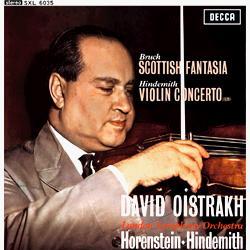
25 Years pure Analogue
Are your records completely analogue?
Yes! This we guarantee!
As a matter of principle, only analogue masters are used, and the necessary cutting delay is also analogue. All our cutting engineers use only Neumann cutting consoles, and these too are analogue. The only exception is where a recording has been made – either partly or entirely – using digital technology, but we do not have such items in our catalogue at the present time
Are your records cut from the original masters?
In our re-releases it is our aim to faithfully reproduce the original intentions of the musicians and recording engineers which, however, could not be realised at the time due to technical limitations. Faithfulness to the original is our top priority, not the interpretation of the original: there is no such thing as a “Speakers Corner Sound”. Naturally, the best results are obtained when the original master is used. Therefore we always try to locate these and use them for cutting. Should this not be possible, – because the original tape is defective or has disappeared, for example – we do accept a first-generation copy. But this remains an absolute exception for us.
Who cuts the records?
In order to obtain the most faithful reproduction of the original, we have the lacquers cut on the spot, by engineers who, on the whole, have been dealing with such tapes for many years. Some are even cut by the very same engineer who cut the original lacquers of the first release. Over the years the following engineers have been and still are working for us: Tony Hawkins, Willem Makkee, Kevin Gray, Maarten de Boer, Scott Hull, and Ray Staff, to name but a few.
At the beginning of the ‘90s, in the early days of audiophile vinyl re-releases, the reissue policy was fairly straightforward. Companies such as DCC Compact Classics, Mobile Fidelity, Classic Records and others, including of course Speakers Corner, all maintained a mutual, unwritten code of ethics: we would manufacture records sourced only from analogue tapes.
Vinyl’s newfound popularity has led many other companies to jump on the bandwagon in the hope of securing a corner of the market. Very often they are not so ethical and use every imaginable source from which to master: CDs, LPs, digital files and even MP3s.
Even some who do use an analogue tape source employ a digital delay line, a misguided ’80s and ‘90s digital technology that replaces the analogue preview head originally used to “tell” the cutter head in advance what was about to happen musically, so it could adjust the groove “pitch” (the distance between the grooves) to make room for wide dynamic swings and large low frequency excursions. Over time analogue preview heads became more rare and thus expensive.
So while the low bit rate (less resolution than a 16 bit CD) digital delay line is less expensive and easier to use than an analogue “preview head”, its use, ironically, results in lacquers cut from the low bit rate digital signal instead of from the analogue source!
Speakers Corner wishes to make clear that it produces lacquers using only original master tapes and an entirely analogue cutting system. New metal stampers used to press records are produced from that lacquer. The only exceptions are when existing metal parts are superior to new ones that might be cut, which includes our release of “Elvis is Back”, which was cut by Stan Ricker or several titles from our Philips Classics series, where were cut in the 1990s using original master tapes by Willem Makkee at the Emil Berliner Studios. In those cases we used only the original “mother” to produce new stampers.
In addition, we admit to having one digital recording in our catalogue: Alan Parsons’ “Eye in the Sky”, which was recorded digitally but mixed to analogue tape that we used to cut lacquers.
In closing, we want to insure our loyal customers that, with but a few exceptions as noted, our releases are “AAA”— analogue tape, an all analogue cutting system, and newly cut lacquers.
PALLAS
Audiophile Vinyl - Made in Germany For over 60 years the family business in the third generation of the special personal service and quality "Made by Pallas" is known worldwide. Our custom PVC formulation produces consistently high pressing quality with the lowest surface noise in the industry. Our PVC complies with 2015 European environmental standards and does not contain toxic materials such as Lead, Cadmium or Toluene. Our vinyl is both audiophile and eco-grade!
